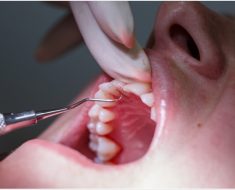We recently published landmark research showing how lifestyle can influence our risk of cancer, and what factors could help prevent it. We found that around 4 in 10 cancer cases could be prevented by things like not smoking, keeping a healthy weight, enjoying the sun safely and cutting back on alcohol. But there are more sides to cancer prevention research than just smoking and obesity. Here we look at some of them.
1. Vaccination
Infection with the human papillomavirus (HPV) is very common. And while it doesn’t usually cause cancer, the virus is responsible for virtually all cases of cervical cancer in the UK. It infects our cells and can cause them to divide out of control, which in some people with persistent infections can lead to cancer.
The HPV vaccine protects against the most common types of the virus, which cause around 7 in 10 cervical cancer cases in the UK. Protecting against the cause of those cancers should prevent them developing. The vaccine has been offered to girls aged 11-13 through the NHS since 2008. And we should start to see the decrease in cervical cancer cases in the coming years as women who received the vaccine reach the age where cervical cancer is most common.
2. Cervical screening
As well as a vaccine to help protect against cervical cancer, the UK’s cervical screening programme also prevents cervical cancers. Cervical screening is designed to pick up changes in the cervix that can sometimes become cancerous so they can be treated, stopping cancer before it starts.
This is done by taking a sample of cells and sending them to a lab where they are tested to see if they are normal (cytology). Testing for HPV infection is carried out on abnormal cells, to see if they may be becoming cancerous. But soon the order of the tests will switch, and the cells will be tested for HPV infection first. Only those that have the virus will be examined for signs the cells aren’t normal. Research has shown that testing for HPV first is a better way to screen for cervical cancer than cytology testing, as all cases in the UK are linked to HPV infection.
This switch will happen across England, Scotland and Wales by December 2019, and will help prevent hundreds of cervical cancer cases a year.
But screening can’t prevent cancer if people don’t do it. That’s why we’re also funding research to understand what influences women’s screening decisions, so we can provide them with better information.
3. A pill to prevent breast cancer?
Using drugs to prevent cancer (chemoprevention) is a relatively new approach, but it has been shown to be effective for people at high risk of certain cancers.
Tamoxifen is a breast cancer drug that has been available for decades to treat the disease and stop it coming back. But more recently it has also been shown to have benefits for preventing breast cancer developing in the first place.
We funded the International Breast Cancer Intervention Study (IBIS-I), which looked at the preventative effects of tamoxifen in women at high risk of breast cancer. The study found that taking tamoxifen reduces the rate of breast cancer by around a third. Follow-up research then found another drug, called anastrozole, can have even bigger preventative effects for these high risk women.
But taking drugs to prevent cancer only makes sense if the benefits outweigh the harms. And although there are undoubted benefits of tamoxifen and anastrozole – stopping some women from getting breast cancer – these drugs come with side effects. That’s why the drugs are only recommended for women who are at higher risk of breast cancer.
4. Bowel screening
In England, bowel scope screening is being rolled out. This is where a specialist uses a thin tube with a camera at the end to look inside the bowel. It’s designed to spot small growths in the bowel, called polyps, which may develop into cancer if they aren’t removed. So as well as picking up bowel cancers early, when treatment is more likely to be successful, bowel scope screening can also help prevent cancer.
Research has shown that people having bowel scope screening just once have a 35% lower risk of developing bowel cancer. It’s offered as a one-off test to men and women at the age of 55 in England, but isn’t fully available across the country now.
5. Aspirin – a wonder drug?
Years of research has pointed to aspirin as a potential way to prevent bowel cancer. It reduces the risk of bowel cancer in people with an inherited disorder called Lynch syndrome, which puts them at high risk of bowel cancer.
But there are still unanswered questions around how it could work for the general population and its safety. Just as with tamoxifen and anastrozole, it’s important to make sure that the benefits of reducing cancer risk outweigh the harms of a drug’s side effects. We’re funding several trials into the potential preventative effects of aspirin, including a recently announced study which aims to answer the final questions before aspirin could be recommended to reduce cancer risk.
There isn’t one simple fix
While a vaccine, a test or a pill to prevent cancer all sound like ideal options, we haven’t completely solved some of these puzzles. That’s because for these approaches to work they are often tied to preventing certain cancers and in people at higher risk.
But there are proven ways to reduce the risk of many cancers, including not smoking and keeping a healthy weight. That’s also why we want the Government to act so that the healthy choice is the easy choice, allowing everyone to reduce their risk of cancer.
Source: Read Full Article





